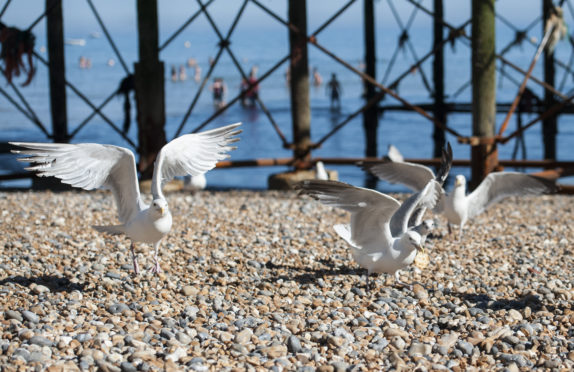
Worried about how to protect your seaside chips from pesky seagulls? Scientists believe the answer lies in an old-fashioned stare down.
The would-be feathered thieves are more likely to strike when they can swoop in under the radar, avoiding the gaze of their victims, researchers say.
Staring at the birds makes them less likely to steal your food, according to the new study.
University of Exeter researchers put a bag of chips on the ground and tested how long it took herring gulls to approach when someone was watching them.
They compared this to how long it took when the person looked away.
On average the gulls took 21 seconds longer to approach the food they often cheekily swipe from unsuspecting snackers while they were being stared at.
The researchers attempted to test 74 gulls, but most flew away or would not approach.
Only 27 approached the food, and 19 completed both the “looking at” and “looking away” tests. The findings focus on these 19 gulls.
Lead author Madeleine Goumas, of the Centre for Ecology and Conservation at Exeter’s Penryn Campus, said: “Gulls are often seen as aggressive and willing to take food from humans, so it was interesting to find that most wouldn’t even come near during our tests.
“Of those that did approach, most took longer when they were being watched.
“Some wouldn’t even touch the food at all, although others didn’t seem to notice that a human was staring at them.”
She added that the team did not look at why individual birds were so different, but it may have been because some might have had positive experiences of being fed by humans.
“But it seems that a couple of very bold gulls might ruin the reputation of the rest,” she said.
Senior author Dr Neeltje Boogert added: “Gulls learn really quickly, so if they manage to get food from humans once, they might look for more.
“Our study took place in coastal towns in Cornwall, and especially now, during the summer holidays and beach barbecues, we are seeing more gulls looking for an easy meal.
“We therefore advise people to look around themselves and watch out for gulls approaching, as they often appear to take food from behind, catching people by surprise.
“It seems that just watching the gulls will reduce the chance of them snatching your food.”
The researchers say the UK’s herring gulls are in decline, but numbers in urban areas are rising.
The birds in these areas are often considered a nuisance because of behaviours like food-snatching, they add.
The researchers say their study shows any attempt to manage this issue by treating all gulls as being alike could be futile, as most gulls are wary of approaching people.
Instead, people might be able to reduce food-snatching by a few bold individuals by modifying their own behaviour.
The natural diet of herring gulls is fish and invertebrates, and the researchers will next investigate how eating human foods affects the birds and their chicks in the long term.
The study is published in the journal Biology Letters.

Enjoy the convenience of having The Sunday Post delivered as a digital ePaper straight to your smartphone, tablet or computer.
Subscribe for only £5.49 a month and enjoy all the benefits of the printed paper as a digital replica.
Subscribe